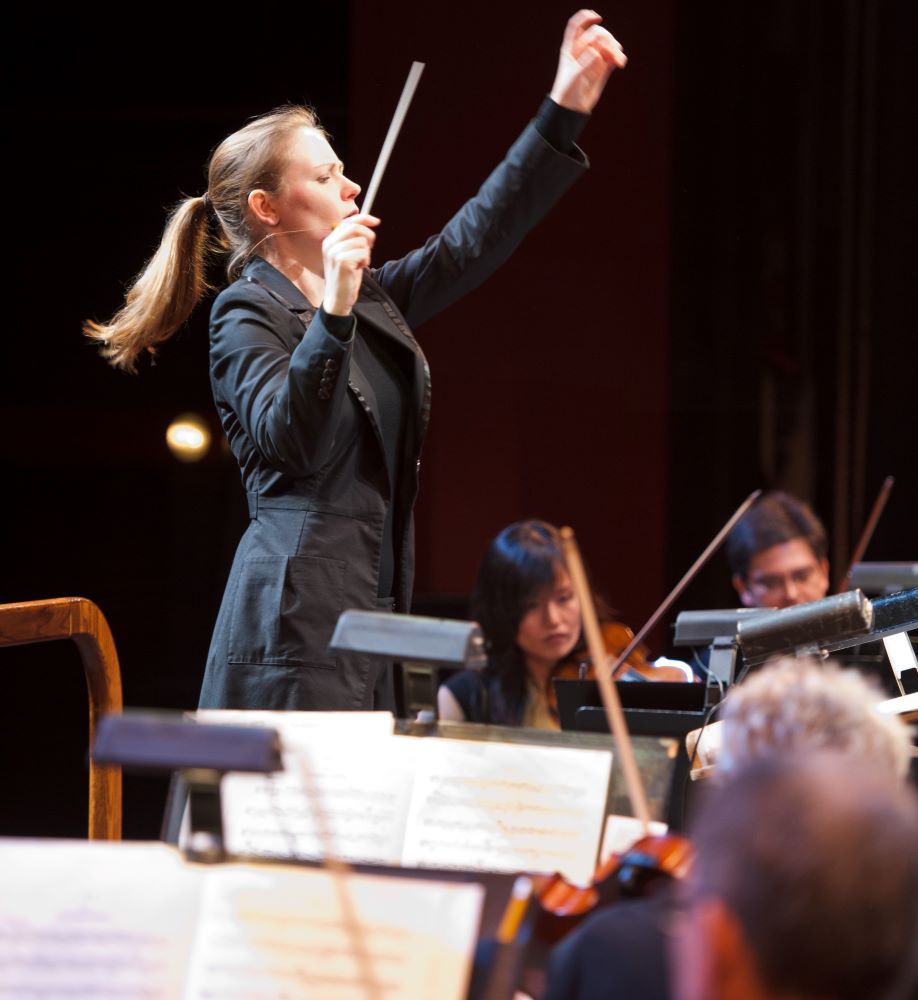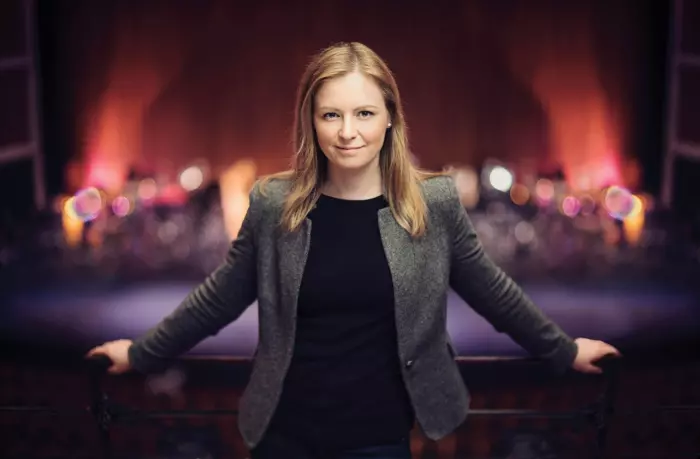Gemma New was 12 and playing in the violin section of a Wellington youth orchestra when she heard a sound so perfect, so overwhelming, that she knew what she wanted to do with the rest of her life. The sound was The Great Gate of Kiev, a brassy, percussive tour de force, written for piano by Modest Mussorgsky and later orchestrated by Maurice ‘Boléro’ Ravel.
Even now, 21 years later, there’s still marvel in New’s voice when she describes how it felt to be on stage in her hometown that night.
“We had all these young people playing their hearts out. I just thought, I want to be part of the orchestra forever; I don’t know how yet, but I’ll find a way.”
New’s way included a music degree from Canterbury University, followed by study at the prestigious Peabody Institute in Baltimore, conducting fellowships and guest positions at some of America’s most important orchestras, and, finally, her appointment in 2015 as music director of the Hamilton Philharmonic (that’s Hamilton, Ontario, not Hamilton, Waikato). These days, New is the one totally in charge when she goes searching for that 12-year-old’s sense of awe. She occasionally finds it, too.
“Sometimes we experience the most moving moments in performance,” she says. “It’s so pure or profound, and the audience feels it, too. At that point I can feel that I love it, and we’re doing a good thing and I want to keep working at it every day.”
So New probably didn’t envisage cooling her heels alone for a couple of weeks in an Auckland hotel.
It wasn’t supposed to be this way, of course. When BusinessDesk first spoke with New in February, she was to be the returning prodigal daughter who, at just 33, is one of the most promising young conductors in the world, among just a handful of women to be music director of an orchestra, and one of even fewer New Zealanders to hold such a post.
 Gemma New. Photo: Fred Stucker
Gemma New. Photo: Fred Stucker
At the tips of her baton-wielding fingers she was to have the New Zealand Symphony Orchestra (New’s first appearance with them); two programmes of powerful, life-affirming music; and, in Johannes Moser, the world’s most exciting cellist, engaged to play Elgar’s popular concerto. It was all planned and ready. And then it wasn’t.
When we catch up with New again, it’s mid-August, Moser can’t get through the border and the conductor is on day 12 of managed isolation. Her tour hangs in the balance.
New will be used to cancellations by now. She was in Canada with the Hamilton Philharmonic when the covid-19 pandemic took hold, and about to begin a rehearsal when her orchestra was abruptly shut down in March. Apart from a tiny recording session in St Louis, New hasn’t stood before an orchestra since.
Not that she’s been lazing around. Unlike most of us, New actually did sharpen her language skills during lockdown. She also spent time programming Hamilton’s 2020-21 concert season, even managing to squeeze in a new work by New Zealand-born composer Juliet Palmer.
It’s an important commission for several reasons. For one, New is passionate about contemporary music. “We love our favourite pieces, but we can delight in the surprise of a new piece,” she says. “It’s music of our time; it’s relevant to our generation and what’s going on in society, so surely we should be moved by it.”
Palmer’s piece is also important because even in 2019, only 13 of the most-performed contemporary composers were women. Moreover, like other industries, classical music has been rocked by high-profile #MeToo scandals. While orchestras have attempted to address the problem, the situation would surely be improved if there were more females in senior positions. However, just eight of the top 100 conductors (judged on the number of performances they give and jobs they hold) are women.
New, who admits she is asked this all the time, does an excellent job of not sounding exasperated when she’s quizzed about the gender imbalance in classical music.
“In New Zealand, I felt very supported as a young female wanting to conduct. I had some great male mentors, like Brian Buggy and Tom Woods in Christchurch. I’ve learnt that it’s not about gender, it’s about personality. So I’m not sure gender has played a massive part in my [professional] growth.”
New takes a pause, then does a marginally less convincing job of not sounding exasperated.
“I would love for it to be a non-issue, and then we can appreciate and value each other for what we can contribute. Not every female is the same, so I think there are other things that are more of a priority, like the way we communicate. Being female is a slight part of my personality, it’s who I am, but there’s also a very large component of other things that make up a person.”
One component every conductor needs is fearlessness. There are few things scarier than a first rehearsal, standing in front of 70 or 80 or 100 strangers, all experts in their field, people who’ve spent longer honing their craft than a brain surgeon, and who are all now staring at you with that look on their faces: go on, show us what you’ve got.
“It’s like meeting a new colleague for the first time,” New reckons, even though it’s really not. “I think the attitude has to be one of mutual respect, with a mutual aim in mind. We have a concert and we want it to be successful, so we are a team and we need to support each other through that. As a conductor it’s your responsibility to lead the rehearsal in a way that creates a working environment based on those principles.”
It hasn’t always been this way. The stories of tyrannical conductors launching shards of angrily snapped baton past musicians’ ears are legion. Those days are mostly gone but a certain amount of bad behaviour is still excused under the guise of ‘artistic temperament’. Perhaps that’s unsurprising. The atmosphere that envelops an orchestra – players and administrative staff alike – is different when a world-class musician is present; every whim is catered to, no request too outlandish. How on earth do you avoid becoming a megalomaniac?
“I was taught as a student that you have to be honest about yourself,” says New. “If you don’t build walls about your personality you can communicate in the best way, with honesty and respect. My position is not to dictate, it’s to support and unite and to solve. No one can perform an orchestral work by themselves; we need to value all the staff who make it possible, and everyone on stage.”
As well as valuing the orchestra, New values the audience. After a concert, she can usually be found in the foyer, chatting with attendees.
“[The audience is] an integral part of the process of making music,” she says. “It’s symbiotic; we need each other. We’re not going to perform music in a hotel room by ourselves. That wouldn’t be music; it’s the act of performing it to an audience.”
New’s concert with the NZSO went ahead on August 29 with no one in the hall and was live-streamed, with NZSO cellist Andrew Joyce sitting in for Johannes Moser. To watch go to nzso.co.nz











